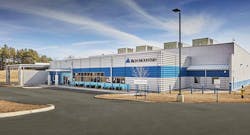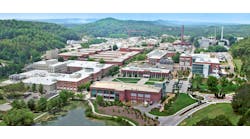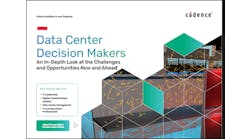It’s no longer just the hyperscale data center operators who are buying green power. A growing number of multi-tenant data center operators are procuring renewable power for their data centers, including providers focused on regional or second-tier markets.
The latest company to provision green power for its data centers is Iron Mountain, which today announced a 15-year agreement to purchase 25 megawatts of wind power capacity from a new wind farm in Ringer Hill, Pennsylvania. Iron Mountain says the deal will provide enough renewable energy to cover all the power used by the company’s three data centers, and will also provide long-term utility price stability and a carbon-neutral solution for the company’s data center customers. Iron Mountain recently signed a purchase agreement at the Amazon Wind Farm Texas and has ongoing investments in solar projects throughout the United States and Canada.
“As our data center business grows, we’re always looking at how best to address power considering it’s the largest operational cost and environmental concern,” said Mark Kidd, senior vice president and general manager, Iron Mountain Data Centers. “Locking in a long-term, reliable and renewable energy supply ensures price stability and cost control, delivering savings back to both Iron Mountain and our customers.'”
Iron Mountain operates two large underground data centers – one at its huge underground storage facility near Pittsburgh, and another at a subterranrean complex near Kansas City. The company also operates a data center on its headquarters campus near Boston, and is building a large data center campus on an 83-acre property in Manassas, Virginia. The company offers retail colocation and wholesale data center services. The first phase of the Virginia campus is scheduled to open in August with 10 megawatts of data center capacity.
Customers Want Renewable Power
The agreement allows Iron Mountain to meet its corporate social responsbility goals. But more importantly, Kidd said, it addresses “growing demand for data center services with affordable, clean, sustainable power.” The company’s customer include many federal agencies and systems integrators that must comply with regulations for the Data Center Optimization Initiative (DCOI) and Executive Order (EO) 13693, enabling Federal Agencies and integrators to meet requirements for energy-efficient, sustainable data centers.
It’s not just government customers demanding that their colocation and data center space be renewable powered. A group of 14 large tech companies is seeking to improve the green power options available to colocation customers the non-profit BSR, which has developed the Corporate Colocation and Cloud Buyers’ Principles to outline best practices for using renewable energy in multi-tenant facilities.
That customer demand is why Iron Mountain isn’t the only regional data center provider buying renewable energy. Multi-tenant providers have been slower to adopt green energy than large hyperscale players like Google and Facebook, but represent a major opportunity to improve the industry’s impact on sustainability and carbon output.
A number of the largest colocation companies are working to provide renewable options for customers. This includes Switch, which operates the SUPERNAP campus in Las Vegas and just opened its new Citadel Campus in Reno. Switch was recently cited by Greenpeace for its leadership on renewable energy, which includes use of 100 percent renewable energy for all of its data centers, its advocacy for policies that support renewable energy, and its transparency in reporting green house gas emissions on a per-site basis. Other multi-tenant providers prioritizing renewable energy for their customers include Equinix, Infomart and Digital Realty.
Smaller Providers Get in the Game
Smaller colocation providers are also now focusing on green power offerings. In addition to Iron Mountain, colocation providers Green House Data and vXchange have also procured meaningful amounts of renewable energy. Both companies made the Environmental Protection Agency’s ranking of the top 30 tech and telecom users of renewable energy, along with Digital Relaty, Equinix, Iron Mountain and 1& 1 Internet.
Green House Data had 15.6 million kilowatt hours (kWh) in clean energy contracts in the EPA’s most recent tracking, an amount equal to 120 percent of its data center footprint. The company is based in Cheyenne, Wyoming and offers colocation and cloud services through a network of seven data centers, with a footprint stretching from New York to Seattle.
vXchange was just behinf Green House Data on the EPA list, with 14 million kWh in annualized contracts for renewable energy. In June 2016, vXchnge’s Pittsburgh data center procured 20 million kWh of wind power to offset the data center’s energy usage for the next three years, while its Secaucus, NJ facility bought 21 million kWh of wind power over the same period.
“Sustainability is a top priority as we invest and scale our business,” said Keith Olsen, CEO of vXchnge. “We continue to improve our data center efficiencies with intelligent software-based infrastructures and improved designs. These investments optimize our data center power and cooling performance and improve environmental impacts that legacy technologies cannot afford. Our investment in these technologies and practices are improving our data center operations, increasing scale, improving power and cooling resiliencies and benefitting the environments where we operate.”
vXchange offers colocation services in second-tier markets, with 14 data center locations in Austin, Chappaqua, Cleveland, Minneapolis, Nashville, New York, Philadelphia, Pittsburgh, Portland, Raleigh-Durham, Santa Clara, Secaucus, St. Louis and St. Paul.






